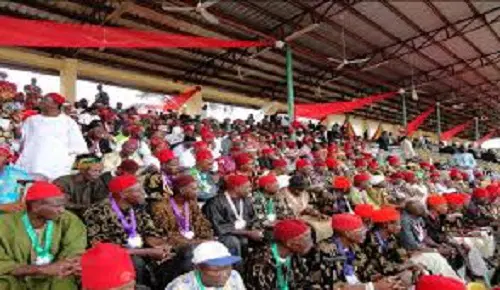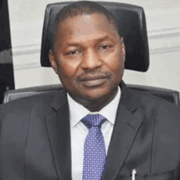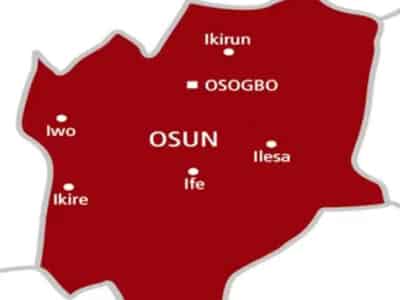
The rising trend of celebrating wealth acquired through questionable means in Igbo land has drawn sharp criticism from leaders across various sectors, who are advocating a return to the traditional values of integrity, hard work, and accountability. Governor Chukwuma Soludo of Anambra State, alongside religious and traditional leaders, has expressed deep concerns over the moral and ethical decline, warning of its dire consequences for the society.
Governor Soludo, speaking during an Anglican Bishops’ retreat at All Saints’ Cathedral, Onitsha, called attention to the cultural shift towards glorifying “something for nothing.” He blamed this mentality for fueling a range of societal issues, including insecurity, youth unemployment, and the erosion of Igbo identity. “We now live in a society where we celebrate wealth without questioning its source. Even in Christianity, we preach that one can have a crown without a cross,” Soludo said. He criticized the rising influence of “warped theology,” where pastors promise riches through tithing without emphasizing the value of hard work.
The governor linked the normalization of quick money schemes to the increasing crime rates in Igbo land, including ritual killings, kidnapping, and internet fraud. “If youths spend their mornings in beer parlors and expect to build skyscrapers tomorrow, how is that realistic? The church and society must hold people accountable for their wealth,” he argued.
Religious leaders have echoed these sentiments, highlighting the role of churches in promoting societal decay. Bishop Sunday Onuoha of the Methodist Church lamented how many clerics prioritize prosperity messages over moral teachings, creating a disillusioned and angry youth population. “Young people see those with questionable wealth celebrated in churches and communities, and they become emboldened to pursue unethical means to achieve similar status,” Onuoha said. He urged religious institutions to stop honoring individuals without verifying the sources of their wealth.
Professor Damian Opata, an academic expert in African fiction, pointed to the failure of parenting as a key driver of the moral crisis. He noted that many parents no longer provide adequate moral training for their children, often prioritizing work or business over raising their families. “Some parents go as far as encouraging their children to learn internet fraud from so-called successful fraudsters. This failure at home creates a generation ungrounded in ethics,” Opata stated. He also highlighted the flashy lifestyles of some individuals as a negative influence, as it normalizes wealth without visible means of livelihood.
Traditional rulers have also weighed in, advocating for a return to the original Igbo customs and traditions. Ezeogo Sunday Oketa, the monarch of Nkaliki Echara Unuhu in Ebonyi State, described the current trend as a deviation from the hard-working and independent spirit of the Igbo people. “Our ancestors were known for their diligence and genuine business practices. The recent abandonment of these values, coupled with the influence of Western culture, has led to the get-rich-quick mentality among our youths,” he said. Oketa called for the restoration of cultural practices that emphasize integrity and communal accountability.
Chief Gabriel Ndubuisi, a community leader in Dunukofia, Anambra State, criticized the societal practice of celebrating individuals with ostentatious wealth without questioning its origins. “It is troubling to see someone parade expensive cars and receive applause without any visible means of livelihood. This sets a dangerous precedent for our youths,” he remarked.
Bishop Emmanuel Uzoma of Alive Theological Seminary in Owerri placed the blame on multiple sectors, including the government, churches, families, and communities. He argued that systemic corruption, lack of job opportunities, and misplaced societal priorities have all contributed to the problem. “Communities confer chieftaincy titles on wealthy individuals regardless of how they made their money, while governments fail to create jobs. The church, too, is complicit, as many focus on prosperity preaching instead of moral reorientation,” Uzoma noted.
The impact of this trend is not limited to the immediate society. Evang. Okechukwu Ukaegbu of the Church of God Seventh Day warned that the younger generation has adopted wealth as the ultimate goal, often at the expense of education and ethical behavior. “Some students have dropped out of school to pursue internet fraud, while others engage in more heinous crimes like organ trafficking. Parents and religious leaders must take responsibility for instilling proper values,” Ukaegbu said.
The situation has also drawn criticism from cultural organizations like Ohanaeze Ndigbo. Professor Chidi Osuagwu, a former state chairman, described the state of Igbo society as one of moral anomie. “The Igbo people are navigating a cultural identity crisis within a larger Nigerian system that undermines their values. We must take this as an opportunity to reflect on who we are and what we stand for,” he said.
Musicians and entertainers were also criticized for their role in glorifying questionable wealth. Chief Azuka Okoroigwe noted that songs and videos promoting flamboyant lifestyles influence young people negatively. “When musicians celebrate those with ill-gotten wealth, it sends a message to the youth that the ends justify the means,” he said.
Amid these criticisms, there is a call to action for collective reform. Leaders emphasized the need for moral reorientation, stricter accountability for wealth, and a return to traditional Igbo values that prioritize hard work, honesty, and communal integrity. “We must act now to reclaim our society and secure the future of Igbo land,” Soludo concluded.




















Comments